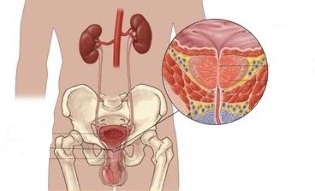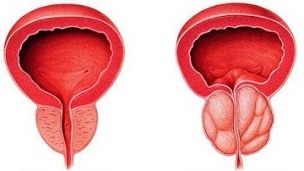Varieties of prostatitis and the reasons for its development
Prostatitis is a disease of the prostate, accompanied by an inflammatory process in its tissues. Prostatitis is classified according to the following data:- acute bacterial prostatitis caused by infectious agents.
- chronic bacterial (infectious) prostatitis?
- chronic bacterial (non-infectious) prostatitis?
- asymptomatic inflammatory prostatitis.

- severe hypothermia?
- problem emptying your bladder.
- unstable sex life (irregularity or lack thereof).
- concomitant chronic diseases of the urinary system.
- leading an unhealthy lifestyle.
- lack of mobility.
Most of the time the disease progresses without obvious symptoms, making it felt only during periods of deterioration, accompanied by signs such as:
- discomfort and incomplete urination.
- reduced sexual activity
- lower abdominal pain
In addition, chronic prostatitis can cause various diseases of the bladder, leading to the stage of acute onset of the disease and then already providing treatment for the worsening of chronic prostatitis.
Chronic bacterial prostatitis - the incidence is 92-95% of all types of prostatitis, according to these data, one can judge the prevalence. This disease has no age limit, so it affects men of any age, but the peak drops to an average of thirty years. The disease is diagnosed based on the following symptoms:
- presence of painful discomfort (more than 3 months) in the pelvic organs.
- there are no signs of an infectious environment.
- increase sexual dysfunction and urination process.
It is also possible to distinguish between chronic prostatitis in urology, which in turn is a consequence of chronic prostatitis and is of more concern to older men.
Can chronic prostatitis be cured?
Every patient is tormented by the question of the effectiveness of the treatment of chronic prostatitis, because this disease not only brings a lot of suffering of a specific nature, but also causes some psychological trauma for a man.
Taking into account the different directions in the application of the methods, we note that this appointment is made by a specialist based on diagnostic measures. The urologist individually prepares a comprehensive treatment program for prostatitis, which includes a wide range of treatment procedures. Thus, a comprehensive conservative approach includes:
- medication for chronic prostatitis?
- physiotherapy?
- manual treatment.
As noted, a specialist selects an individual program that is subject to adjustments to the general regimen and each individual patient is a separate course of treatment for chronic prostatitis, calculated by his or her treating physician.
Effective treatment of chronic prostatitis mainly includes the following additional research:

- consultation with a neuropsychiatrist, endocrinologist, cardiologist.
- performing a computed tomography or magnetic resonance imaging (MRI) scan of the brain to examine its functions and structure.
- hormonal status research?
- Ultrasound of the urinary system.
How to treat chronic prostatitis if the patient does not show symptoms? This case means that the patient is in remission or the disease is asymptomatic, the second case, of course, requires an immediate visit to a specialist who will perform all the necessary procedures. Treatment conditions for chronic prostatitis usually range from 2 weeks or more, depending on the condition of the prostate and the degree of the disease.
For example, drugs for the treatment of chronic prostatitis require constant intake in men, which is associated with the disease reducing arterial blood flow to the penis. And to increase this blood flow and cause an erection, continuous vasodilator medication is required.
Treatment of chronic prostatitis at home
In case of exacerbation of chronic prostatitis, follow all the recommendations described below. This is bed rest for several days, exclusion of physical activity, refusal of alcohol. After the exacerbation of chronic prostatitis is removed, it is necessary to decide on how you work and rest for many years.
To avoid recurrent exacerbations, the following basic guidelines should always be followed:
Avoid hypothermia - first of all, exclude sitting on cold ground, concrete, stones, even in hot weather. Clothes should be loose, light enough, but suitable for the season. A great way to get rid of exacerbations of chronic prostatitis is to harden the body. You can use water hardening, air baths, be outdoors daily for at least 1-2 hours.How to treat chronic prostatitis with drugs?
The main causes of prostatitis are, first of all, various infections and sexually transmitted viruses, which in turn affect the urethra, which are located in the prostate tissues. It should be noted that when diagnosed with chronic bacterial prostatitis, treatment consists of several stages.
Treating bacterial prostatitis is one of the most difficult tasks in modern urology. Despite advances in diagnosis and early detection of the disease, only in 30% of cases can complete cure be achieved. Modern treatment of bacterial prostatitis consists of several stages and can clearly answer the question: "How is chronic prostatitis treated and how exactly? Success also depends to a large extent on the coordination of the patient-physician chain. Thus, the main stages of treatment:
- pain relief - the use of non-steroidal anti-inflammatory drugs.
- stress reduction - taking antidepressants.
- restore the urination process.
- topical treatment - douching;
- physiotherapy treatment?
- targeted therapy - it is recommended to take medicines prescribed by a doctor for chronic bacterial prostatitis, as well as antibiotics.
- surgical treatment of chronic prostatitis - the use of this method is necessary in cases of narrowing of the urethra and prostate abscesses.
It should be noted that today the treatment of chronic prostatitis with antibiotics is quite justified, but only after the completion of the full course, which includes an average of about 2 weeks. After graduation, the doctor evaluates the results and more often there is a positive trend. Antibiotics for chronic prostatitis are used because this disease is contagious, caused mainly by pathogenic bacteria, which without failure requires antibiotic treatment. The key point is to choose the right medicine according to a clearly chosen regimen of use by the treating physician.
It should be noted in particular that when taking medications for chronic prostatitis, one must strictly adhere to the prescribed treatment regimen, as well as the frequency of dosing.
It is worth remembering that there is no absolute cure for chronic prostatitis and maximum treatment is possible only with a thorough diagnosis and compliance with all the prescriptions of a specialist. Self-medication is particularly harmful for this disease, due to its specialty and severity.


























